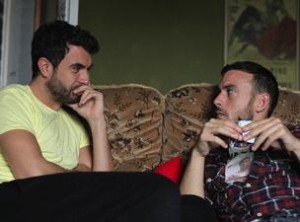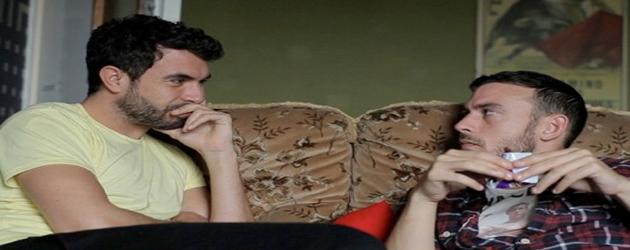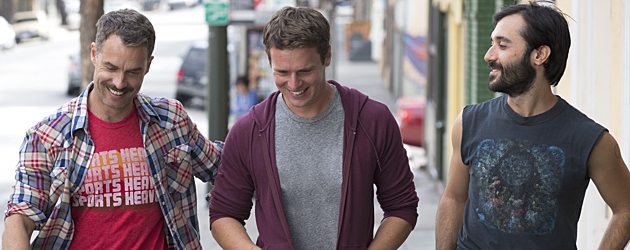
Andrew Haigh’s Weekend is the latest in a flood of queer cinema that know we’re just as capable of loving, hurting and screwing up as any character in a mainstream movie. Photo Credit: IFC
Gay films once overlooked how much we’re actually like everybody else. We live, we hurt, we love. And we don’t all know people who look ready-made for the runway.
But director Andrew Haigh’s Weekend is the latest in a flood of queer cinema that know we’re just as
capable of loving, hurting and screwing up as any character in a mainstream movie. It’s refreshingly outside-the-box with real-people characters who don’t live in some fabricated world where they only speak in dick jokes and only six-packs and a spray tan get you some.
“I didn’t think too much about the other gay films out there,” says Haigh, whose only other movie credit is 2009’s Greek Pete. “I suppose in my head I made the film not thinking it was going to be seen alongside all the other gay films in the world. All I wanted to do was make a good film on its own merit and not fall into the clichés of a lot of gay films.”
Oh, so it was made in opposition to them?
“Yeah, maybe only in retrospect,” admits the British director, who carefully picked the film’s setting (the story is set in Nottingham instead of the what-might-be-more-typical London) and leads, relatively unknowns Chris New and Tom Cullen.
Far from twinky, New and Cullen, as Glen and Russell respectively, engage with each other – sexually, intellectually and emotionally – over a brief period of 48 hours, after meeting at a bar on a Friday night. That’s it. The whole plot. And it’s a romantic slice-of-life that will stay with you longer than a weekend.
How we affect each other, even in brief encounters, is at the core of Haigh’s realistically powerful rumination on human connection. In fact, Glen and Russell’s bond is so evident it’d make Jack and Ennis envious.
“It’s about two people muddling through things and just not quite sure what to do and how to be,” Haigh says. “I suppose it’s just about the confusion of things.
“There are a lot of people who don’t quite understand gay people and gay relationships, but we are all struggling with some of the same issues, as well – whether you’re gay, straight, bisexual or whatever.”
The stubborn and fearlessly bold Glen (New) is experiencing post-relationship damage that leaves him set in his anti-boyfriend ways; Russell (Cullen), the sweet and semi-closeted one, isn’t nearly as freewheeling as Glen, even finding it awkward to recount their first drunken sex shenanigans. Really, the only thing about them that’s the same is their scruff. But for all their differences, both are two of the most relatable characters in gay film.
“I’m probably somewhere in between the two of them,” Haigh attests. “When I’m angry, I’m more like Glen; when I’m not, I’m more like Russell. I’m certainly not as dogmatical as Glen.”
Says New: “There are a lot of people who are quite similar to (Glen) who have had some sort of difficulties. I mean, it’s a hard thing to say now, because there are so many different ways for people to grow up being gay. It’s not just you’re in the closet and suddenly you come out of the closet and everybody hates it.”
In the last few years, after 2005’s Brokeback Mountain set the gay-movies-don’t-have-to-suck standard in motion, filmmakers have tapped into a treasure trove of tales involving LGBT people that haven’t been done to death – many released to critical kudos. Last year’s The Kids Are All Right, awarded a Golden Globe for Best Motion Picture (Musical or Comedy), looked at family dynamics when the children of a lesbian couple want to reach out to their sperm donor dad. Harvey Milk’s legacy was at the center of Gus Van Sant’s 2008 Oscar winner Milk. The next year, style icon Tom Ford made his directorial debut – an artistic masterpiece according to many critics – with A Single Man, starring Colin Firth as a gay man contemplating suicide after his partner’s sudden death.
Now, Weekend joins the ranks of admired gay cinema. After being screened at the SXSW Film Festival, the indie walked away as the Audience Award Winner. “To be honest, it’s crazy,” Haigh says, flustered even just acknowledging it. “I don’t even like to think about that because it’s almost too odd for me. We made the film for not much money, and you don’t know if it’s going to resonate for anybody. I thought it’d be just my mom who’d see it!”
New couldn’t be happier over all the positive buzz, which isn’t just building in the gay community – or among moms. “One of the best things about it is that it hasn’t been a totally gay audience,” says the British actor. “We never even dreamed that people would go see it, but to have a proper release and to have such good word of mouth is really surprising – and across all ages, all sexes, all sexualities.
“Andrew told the story so well that all or any impediment just sort of falls away, because the story’s so strong. I mean, you don’t go, ‘Only beasts and pretty French girls would go see Beauty and the Beast.”
It was Haigh’s intention all along. “I always wanted it to be a film that wasn’t just for a gay audience,” he says, “and that’s important to me, because even though it’s about two gay people – I never wanted to pretend it wasn’t and not water it down to a straight audience – I still wanted it to be acceptable to a wider group of people.”
So don’t worry: There’s sex, and the guys get naked like there’s not a camera in sight. Thankfully there was, though – because both gents can’t only act, but they look good doing it. New wasn’t sure about all the nudity at first, though Haigh assured him it wouldn’t be unwarranted nakedness.
The actor laughs. “But it was to me because, you know, it’s me! But no, I think the balance is right – both in the way emotions are shared and all the other ways in the film. It never goes too far.”
Capable of loving, hurting and screwing up as any character in a mainstream movie. It’s refreshingly outside-the-box with real-people characters who don’t live in some fabricated world where they only speak in dick jokes and only six-packs and a spray tan get you some.
“I didn’t think too much about the other gay films out there,” says Haigh, whose only other movie credit is 2009’s Greek Pete. “I suppose in my head I made the film not thinking it was going to be seen alongside all the other gay films in the world. All I wanted to do was make a good film on its own merit and not fall into the clichés of a lot of gay films.”
Oh, so it was made in opposition to them?
“Yeah, maybe only in retrospect,” admits the British director, who carefully picked the film’s setting (the story is set in Nottingham instead of the what-might-be-more-typical London) and leads, relatively unknowns Chris New and Tom Cullen.
Far from twinky, New and Cullen, as Glen and Russell respectively, engage with each other – sexually, intellectually and emotionally – over a brief period of 48 hours, after meeting at a bar on a Friday night. That’s it. The whole plot. And it’s a romantic slice-of-life that will stay with you longer than a weekend.
How we affect each other, even in brief encounters, is at the core of Haigh’s realistically powerful rumination on human connection. In fact, Glen and Russell’s bond is so evident it’d make Jack and Ennis envious.
“It’s about two people muddling through things and just not quite sure what to do and how to be,” Haigh says. “I suppose it’s just about the confusion of things.
“There are a lot of people who don’t quite understand gay people and gay relationships, but we are all struggling with some of the same issues, as well – whether you’re gay, straight, bisexual or whatever.”
The stubborn and fearlessly bold Glen (New) is experiencing post-relationship damage that leaves him set in his anti-boyfriend ways; Russell (Cullen), the sweet and semi-closeted one, isn’t nearly as freewheeling as Glen, even finding it awkward to recount their first drunken sex shenanigans. Really, the only thing about them that’s the same is their scruff. But for all their differences, both are two of the most relatable characters in gay film.
“I’m probably somewhere in between the two of them,” Haigh attests. “When I’m angry, I’m more like Glen; when I’m not, I’m more like Russell. I’m certainly not as dogmatical as Glen.”
Says New: “There are a lot of people who are quite similar to (Glen) who have had some sort of difficulties. I mean, it’s a hard thing to say now, because there are so many different ways for people to grow up being gay. It’s not just you’re in the closet and suddenly you come out of the closet and everybody hates it.”
In the last few years, after 2005’s Brokeback Mountain set the gay-movies-don’t-have-to-suck standard in motion, filmmakers have tapped into a treasure trove of tales involving LGBT people that haven’t been done to death – many released to critical kudos. Last year’s The Kids Are All Right, awarded a Golden Globe for Best Motion Picture (Musical or Comedy), looked at family dynamics when the children of a lesbian couple want to reach out to their sperm donor dad. Harvey Milk’s legacy was at the center of Gus Van Sant’s 2008 Oscar winner Milk. The next year, style icon Tom Ford made his directorial debut – an artistic masterpiece according to many critics – with A Single Man, starring Colin Firth as a gay man contemplating suicide after his partner’s sudden death.
Now, Weekend joins the ranks of admired gay cinema. After being screened at the SXSW Film Festival, the indie walked away as the Audience Award Winner. “To be honest, it’s crazy,” Haigh says, flustered even just acknowledging it. “I don’t even like to think about that because it’s almost too odd for me. We made the film for not much money, and you don’t know if it’s going to resonate for anybody. I thought it’d be just my mom who’d see it!”
New couldn’t be happier over all the positive buzz, which isn’t just building in the gay community – or among moms. “One of the best things about it is that it hasn’t been a totally gay audience,” says the British actor. “We never even dreamed that people would go see it, but to have a proper release and to have such good word of mouth is really surprising – and across all ages, all sexes, all sexualities.
“Andrew told the story so well that all or any impediment just sort of falls away, because the story’s so strong. I mean, you don’t go, ‘Only beasts and pretty French girls would go see Beauty and the Beast.”
It was Haigh’s intention all along. “I always wanted it to be a film that wasn’t just for a gay audience,” he says, “and that’s important to me, because even though it’s about two gay people – I never wanted to pretend it wasn’t and not water it down to a straight audience – I still wanted it to be acceptable to a wider group of people.”
So don’t worry: There’s sex, and the guys get naked like there’s not a camera in sight. Thankfully there was, though – because both gents can’t only act, but they look good doing it. New wasn’t sure about all the nudity at first, though Haigh assured him it wouldn’t be unwarranted nakedness.
The actor laughs. “But it was to me because, you know, it’s me! But no, I think the balance is right – both in the way emotions are shared and all the other ways in the film. It never goes too far.”
We do, however, see Russell’s post-climax stuff all over his tummy. It’s not what you think, though. The trick? Handsoap.
“That’s it,” Haigh says. “We did lot of tests to find what looked the most appropriate. Soap was always the one we used, but getting the right color soap (was the issue) – because sometimes it looks a bit too white, sometimes it’s a bit too yellow. It’s gotta be a little bit off-white.”
“We shouldn’t tell people these tricks!” New says.
Orgasm fakers, though, might find it handy.
“Right!” he says. “Just grab soap and throw it on your partner: ‘See, loads!’”
Soapy sex or not, it was still awkward when it came to, well, shooting those scenes – even though they weren’t the hardest.
“Tom is straight, but he had no problem at all with those scenes,” Haigh says. “They were in the script. Everyone knew they were going to happen. And they were just as difficult for Chris as they were for Tom. And they were fine. They were more nervous about the big dialogue scenes than they were doing sex scenes.”
Those conversational scenes were worked out at the apartment the two of them shared, where Cullen and New stayed for the month-long shoot. (“Longer than a weekend,” Haigh quips.) The film was unusually shot in sequence, allowing for spontaneity and, in Haigh’s case, sanity.
“It’s just the way my brain works,” he says. “I find it quite stressful shooting completely out of order.”
It also helped the actors live out the experience of the relationship as if it were actually happening, though New admits how bizarre it is to go between make-believe and real life.
“It’s very strange, actually, because you kind of feel as if you’ve got a very strong connection but know at the same time you don’t; it’s only pretend,” New says. “It’s a very strange thing that your mind does to you.”
But it was worth some insanity – and not just because New was all about the script. He and Haigh also clicked immediately.
“What really got me into the film was when I met Andrew,” he recalls. “We just got deep very, very quickly.”
The film does as well, with intense chats – and sometimes heated arguments – on same-sex marriage and being openly gay. One particularly touching scene involves Glen role-playing Russell’s dad, as if they were reenacting a coming-out.
“The gay struggle, if you want to call it that, changes as new issues arise,” Haigh says, “and I think it’s good to discuss those issues on the screen. I’m sure a lot of people have those same kind of discussions in their own lives.
“I wanted these characters to feel very real. They’re spending this short amount of time together, and I think they would discuss all of these things that go on in their heads as a way to get to know each other and define themselves to each other.”
To critics who say there’s too much chitchat, who say show don’t tell, Haigh adds: “I’ve never really kind of understood that, because in real life people talk a lot. So it seems good to me to put that on screen sometimes. Because people do talk.”
They do, and many of them are talking about the sexuality of one of the actors, Cullen, who’s actually straight. Heterosexuals flip-flopping is nothing new in film (Heath Ledger and Jake Gyllenhaal did it in “Brokeback Mountain”), but Haigh’s already getting hell for it.
“We didn’t really want to say to anyone who was gay in real life and who was not, but obviously the question comes up so many times that in the end you just have to be honest,” he says, “and it usually pisses off someone. Some people are like, ‘Why didn’t you use two gay characters?’ You just go with the best people.”
Similarly, he’s getting flack for the way Glen and Russell meet (at a bar), engage (in a bathroom) and then end up (in bed). The film addresses the difficulties of meeting other gay people, and so does Haigh, who defends their encounter: “That’s how I did it, and I think when you’re gay you don’t have so many opportunities to meet people. You kind have to go to bars to meet people” – or fire up Grindr, as the film notes – “so it’s an inevitable part of gay life for a lot of people.”
But Cullen and New’s onscreen connection is so powerfully magnetic, breaking through all sexuality barriers, that Weekend doesn’t just feel restricted to gay life. Just life in general.
“It’s a part of human interaction,” says New, who recently married his partner. “We meet people and some people have very strong effects on us and some don’t, but those strong effects are the ones we remember.”
Even if just for a Weekend.




